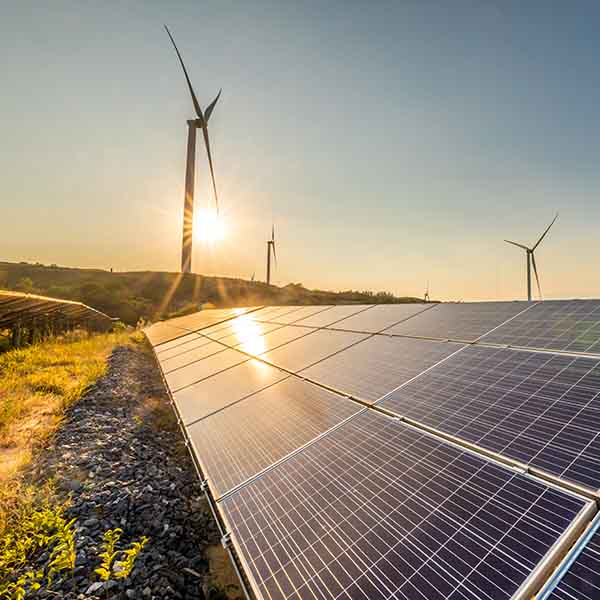MSc Sustainable Engineering: Renewable Energy Systems & the Environment
ApplyKey facts
- Start date: September
- Accreditation: Energy Institute/Institution of Mechanical Engineers/Royal Aeronautical Society
- Study mode and duration: MSc: 12 months full-time; 24 months part-time
Scholarship: Faculty of Engineering International Scholarship for new international students
Study with us
- examine the design and operation of the energy systems that provide the environments in which people live and work
- cross-disciplinary programme with input from industry
- satisfy key requirements to attain Chartered Engineer status
- develop sought-after understanding of sustainable approaches and practices
The Place of Useful Learning
UK University of the Year
Daily Mail University of the Year Awards 2026
Scottish University of the Year
The Sunday Times' Good University Guide 2026
Why this course?
Renewable Energy Systems and the Environment is one of the pathways offered within our Sustainable Engineering programme. Examining how quality of life can be balanced by the need for conservation of world resources, you'll explore the impact energy has on the environment and how it can be reduced
You’ll learn about different energy needs, renewable energy resources, and systems that control these resources, such as:
- demand for power, heating, and cooling
- energy storage
- heat pumps
- solar energy
- wind and hydro energy
- high efficiency systems
- advanced materials
- advanced controls
- buildings and indoor environments
- integrated heating, cooling and power systems (at various scales)
Our course has been running for more than 20 years and has over 400 graduates. External examiners consistently refer to our beneficial links with industry and the high quality of our project work.


What you’ll study
You’ll study at least three generic modules and up to five specialist modules.
Major projects
Group project
You'll work together in a group of four or five students on a project focusing on a particular energy/environment system. Each project includes a technical appraisal, and, where appropriate, an assessment of its cost effectiveness and environmental impact.
At the end of the project, you'll present to invited guests from industry during the University’s Knowledge Exchange week. This event provides an important networking opportunity for students.
Take a look at some previous group projects.
Individual project
You'll work independently on an energy topic with a more in-depth analysis than in the group project.
Facilities
Students have access to departmental laboratories with a range of testing equipment. For example, a recent MSc project included the use of sophisticated thermal measurement of thermal storage materials undertaken in the Advanced Materials Research Laboratory.
Student competitions
Students can enter a number of competitions, which vary year-to-year. Recent examples include:
- District Heating and Cooling (DHC+) Student Competition
- Chartered Institution of Building Services Engineers Simulation Group Award for Best MSc Dissertation
Guest lectures
Students are regularly invited to talks by research visitors from the Energy Systems Research Unit. Talks on career options are also given by representatives of the Energy Institute.
Accreditation
The course is approved by the Energy Institute, the Institution of Mechanical Engineers and the Royal Aeronautical Society and meets the academic requirements for Chartered Engineer (CEng) status.
Students are encouraged to take up free membership of these professional organisations
Energy Resources & Policy (10 credits)
Against the background of international commitments on atmospheric emissions, diminishing fossil fuel resources, renewable energy systems deployment and the liberalisation of energy markets, this module examines sustainable options for energy production, supply and consumption. The aim is to give students an understanding of current trends in the energy market, and to enable a critical evaluation of emerging ideas, technologies and policies especially in relation to new and renewable energy supply systems.
Energy Systems Analysis (10 credits)
This module aims to impart an understanding of the underpinning theoretical principles and practical calculation methods for analysis of energy systems and an appreciation of how these systems are integrated in practical applications. Emphasis is on heat transfer and thermodynamic cycles. The underlying principles and analysis methods are appropriate for both renewable and non-renewable energy systems.
Electrical Power Systems (10 credits)
This module provides students with an understanding of the operation of modern electrical power systems featuring renewable and low carbon generation, along with the techniques to undertake a basic technical analysis of key electrical devices and systems.
Energy Modelling & Monitoring (10 credits)
This module provides an understanding of the theoretical and operational principles underlying simulation modelling of energy supply and demand systems and their environmental impact. The emphasis is on practical computer lab-based modelling exercises. It covers detailed energy system simulation, supply-demand matching, energy management and monitoring.
Sustainability (10 credits)
This module provides students with an understanding of the concepts of sustainability and sustainable development. The social, environmental, and economic impact of development strategies will be identified and the mitigation of negative impacts discussed. Topics covered include shifting world views with respect to technology and ecology, green politics, climate change, sustainable development and limits to growth.
Sustainable Engineering Group Project (40 credits)
In this part of the course, projects are offered for selection by groups of typically four individuals. Each project involves the evolution of an energy/environmental system, including a technical appraisal and, where appropriate, an assessment of its cost effectiveness and environmental impact. There will also be site visits to renewable energy system installations.
Select three classes from the following:
Design Management (10 credits)
This module provides a structured introduction to the Design Management process, issues and tools. Topics include Integrated Product Development, and the different approaches and aspects to design development including concurrent engineering, team engineering, product management, design management, distributed design, and decision support. Other topics cover the design activity, team and management organisational structures, key issues concerning design complexity, and design performance and innovation.
Project Management (10 credits)
This module provides students with skills relating to the use of engineering practices in Project Management with particular respect to the effective and efficient use of resources. The syllabus includes an introduction to project management techniques and project control, project networks including critical path analysis, procedural and graphical presentation techniques, an introduction to Contract Law and project budgetary control.
Risk Management (10 credits)
Under Health and Safety legislation, and under the wider European Post-Seveso Directives, it is mandatory for many industries to carry out risk assessments with the aim of showing that risk is As Low As Reasonably Practicable. This module introduces the fundamental techniques of risk analysis and risk-informed decision making. Students will learn the general principles of methods and their place in risk management, as well as the chance to develop skills in applying these methods to variety of engineering examples.
Financial Engineering (10 credits)
This module introduces elements of financial engineering that are applied to reduce risk of business insolvency and enhance the financial robustness of business enterprises. Questions addressed include: What is the best strategy for survival and growth?; What are the options for financing investment projects both in the private and public sectors of an economy?; How would the financial engineer propose to combine loan capital and equity capital to raise funds for an investment initiative; How would he/she advise his/her company/organization to build its investment portfolio to ensure financial security in volatile market conditions?
Environmental Impact Assessment (10 crediits)
Environmental impact assessment (EIA) relates to the process of identifying, evaluating, and mitigating the biophysical, social, economic, cultural and other relevant effects of development proposals prior to major decisions being taken and commitments made. This class, run by the Department of Civil & Environmental Engineering but open to all MSc and MEng students across the University, introduces the methods used to predict environmental impacts, and evaluates how these may be used to integrate environmental factors into decisions.
The class draws principally on the UK planning context of environmental impact assessment of individual projects (project EIA), but also takes account of EIA experience in other countries and international organisations. Participants evaluate the quality of Environmental Statements (or EIA Reports) and of the EIA process using the Institute of Environmental Management and Assessment (IEMA) methodology.
The class discusses how EIA can be used a pro-active design tool for projects and how it can contribute to the enhancement of environmental, social and health issues. Students are also introduced to key principles of Strategic Environmental Assessment (SEA) and biodiversity net gain (BNG). Class has the contribution of key practitioners in the field and includes different case studies, such as proposed onshore and offshore windfarms.
Only students who pass all required taught compulsory and optional modules will progress to the MSc Project.
MSc Project (60 credits)
In this part of the course, students undertake supervised, individual project work, with the award of MSc being made on the basis of an acceptable thesis submission.
Learning & teaching
The course comprises compulsory technical modules, a choice of broader generic modules, which are recommended by accrediting professional bodies, group projects with industry input, and individual projects.
Teaching methods are varied, and include lectures, discussions, group work, informal reviews, on-line questionnaires, and computer modelling laboratories.
Assessment
Assessment of taught modules are by written assignments and exams. Group projects are assessed by project websites and presentations. Individual projects are assessed on the submitted thesis.
Our students

Lesley Thomson
I chose to study at Strathclyde because of the strong reputation of its engineering department and links to industry. I felt that the course was what I was looking for in terms of its technical content as well as having the option to choose electives that suit my interests.

Shaina Agwan
The programme connects mechanical, electrical, and sustainable engineering together, combined with knowledge on renewables and the environment. My favourite parts of the course are learning about challenges in energy transition and how we can mitigate climate change.

Aisha Ali
I would recommend Strathclyde to anyone. This university is unique in every aspect. I am receiving great support from outstanding professors in my studies and all the Faculty staff have been so friendly
Entry requirements
| Academic requirements/experience | Normally a first-class or second-class honours degree (or international equivalent) in architecture, engineering or related subject. Entry may be possible with other qualifications provided there is evidence of relevant experience and of the capacity for postgraduate study. |
|---|---|
| English language requirements | If English is not your first language, please visit our English language requirements page for full details of the requirements in place before making your application. |
Pre-Masters preparation course
The Pre-Masters Programme is a preparation course held at the University of Strathclyde International Study Centre, for international students (non-UK/Ireland) who do not meet the academic entry requirements for a Masters degree at University of Strathclyde.
Upon successful completion, you'll be able to progress to this degree course at the University of Strathclyde.
International students
We've a thriving international community with students coming here to study from over 140 countries across the world. Find out all you need to know about studying in Glasgow at Strathclyde and hear from students about their experiences.

Chat to a student ambassador
Want to know more about what it’s like to be a student at the University of Strathclyde? A selection of our current students are here to help!
Our Unibuddy ambassadors can answer all the questions you might have about courses and studying at Strathclyde, along with offering insight into their experiences of life in Glasgow and Scotland.
Fees & funding
All fees quoted are for full-time courses and per academic year unless stated otherwise.
Fees may be subject to updates to maintain accuracy. Tuition fees will be notified in your offer letter.
All fees are in £ sterling, unless otherwise stated, and may be subject to revision.
Annual revision of fees
Students on programmes of study of more than one year (or studying standalone modules) should be aware that the majority of fees will increase annually.
The University will take a range of factors into account, including, but not limited to, UK inflation, changes in delivery costs and changes in Scottish and/or UK Government funding. Changes in fees will be published on the University website in October each year for the following year of study and any annual increase will be capped at a maximum of 10% per year. This cap will apply to fees from 2026/27 onwards, which will not increase by more than 10% from the previous year for continuing students.
| Scotland | £12,550 |
|---|---|
| England, Wales & Northern Ireland | £12,550 |
| Republic of Ireland |
If you are an Irish citizen and have been ordinary resident in the Republic of Ireland for the three years prior to the relevant date, and will be coming to Scotland for Educational purposes only, you will meet the criteria of England, Wales & Northern Ireland fee status. For more information and advice on tuition fee status, you can visit the UKCISA - International student advice and guidance - Scotland: fee status webpage. Find out more about the University of Strathclyde's fee assessments process. |
| International | £32,800 |
| Additional costs | Optional textbooks and printed materials:
Visa & immigration: International students may have associated visa and immigration costs. Please see student visa guidance for more information. |
| Available scholarships |
Take a look at our scholarships search for funding opportunities. |
Please note: the fees shown are annual and may be subject to an increase each year. Find out more about fees.
Scholarships available for September 2026
Faculty of Engineering International Scholarship for Masters Study
We are delighted to offer our Faculty of Engineering International Scholarship for Masters Study for applicants to postgraduate taught degrees starting in September 2026. The scholarship award of £6,000 will be deducted from tuition fees.
Dean's International Excellence Awards
We also have a limited number of Dean’s International Excellence Awards for postgraduate taught applicants joining the Faculty of Engineering in September 2026. These scholarships are worth between £9,000 and £12,000 and will be offered to exceptional applicants at postgraduate taught level only.
How can I fund my course?
Scottish postgraduate students
Scottish postgraduate students may be able to apply for support from the Student Awards Agency Scotland (SAAS). The support is in the form of a tuition fee loan and for eligible students, a living cost loan. Find out more about the support and how to apply.
Don’t forget to check our scholarship search for more help with fees and funding.
Students coming from England
Students ordinarily resident in England may be to apply for postgraduate support from Student Finance England. The support is a loan of up to £10,280 which can be used for both tuition fees and living costs. Find out more about the support and how to apply.
Don’t forget to check our scholarship search for more help with fees and funding.
Students coming from Wales
Students ordinarily resident in Wales may be to apply for postgraduate support from Student Finance Wales. The support is a loan of up to £10,280 which can be used for both tuition fees and living costs. Find out more about the support and how to apply.
Don’t forget to check our scholarship search for more help with fees and funding.
Students coming from Northern Ireland
Postgraduate students who are ordinarily resident in Northern Ireland may be able to apply for support from Student Finance Northern Ireland. The support is a tuition fee loan of up to £5,500. Find out more about the support and how to apply.
Don’t forget to check our scholarship search for more help with fees and funding.
International students
We've a large range of scholarships available to help you fund your studies. Check our scholarship search for more help with fees and funding.
Careers
Job titles include:
- Artificial Intelligence Engineer
- Biomass Engineer
- Renewable Energy Consultant
- Renewable Energy Development Officer
- Technical Analyst
Employers include:
- Greenspan
- Mott Macdonald
- Natural Power
- SSE
- Scottish Power Energy Networks
- The Campbell Palmer Partnership
- RSP Consulting Engineers
Glasgow is Scotland's biggest & most cosmopolitan city
Our campus is based right in the very heart of Glasgow. We're in the city centre, next to the Merchant City, both of which are great locations for sightseeing, shopping and socialising alongside your studies.
Apply
To apply, click on the relevant apply button
As part of the admissions process, you must upload the following supporting documentation. We will be unable to process your application if these are not provided:
- official semester mark sheets/academic transcript showing subjects taken and grades achieved for all qualifications. If you're still studying, please provide your individual semester mark sheets to date
- certified degree certificate for all qualifications. If you're still studying, please provide this after completing your qualification
- evidence of suitable English language proficiency if English is not your first language, or you're not from a “UKVI recognised "Majority English Speaking" country”; check the University’s language requirements
- if you have been out of full-time education for over two years, provide a CV, detailing employment history, organisations worked for, and a brief description of roles and responsibilities demonstrating expertise, skills and suitability for the programme
- a copy of your passport containing your photo and passport number
- a copy of your sponsor letter/scholarship award (if appropriate)
- names, job titles and email addresses of two nominated referees
Start date: Sep 2026
Sustainable Eng: Renewable Energy Systems and the Environment
Start date: Sep 2026
Sustainable Eng: Renewable Energy Systems and the Environment
Contact us
Have you considered?
We've a range of postgraduate taught and Masters courses similar to this one which may also be of interest.

